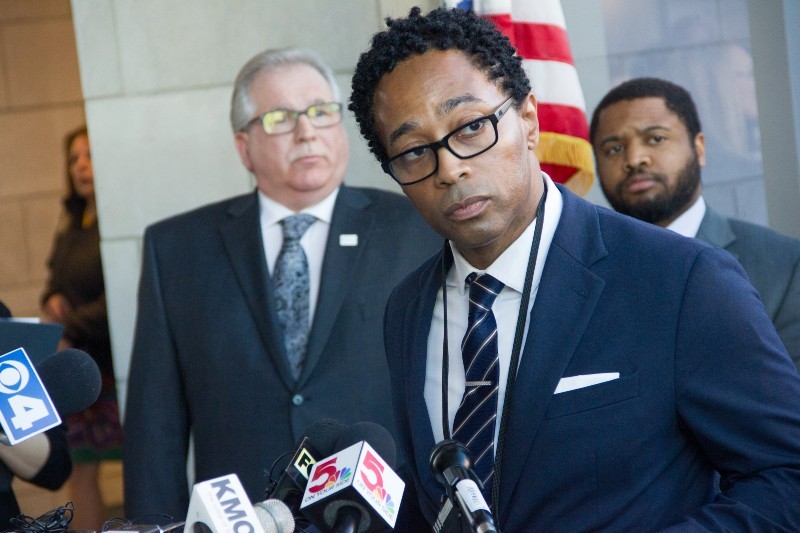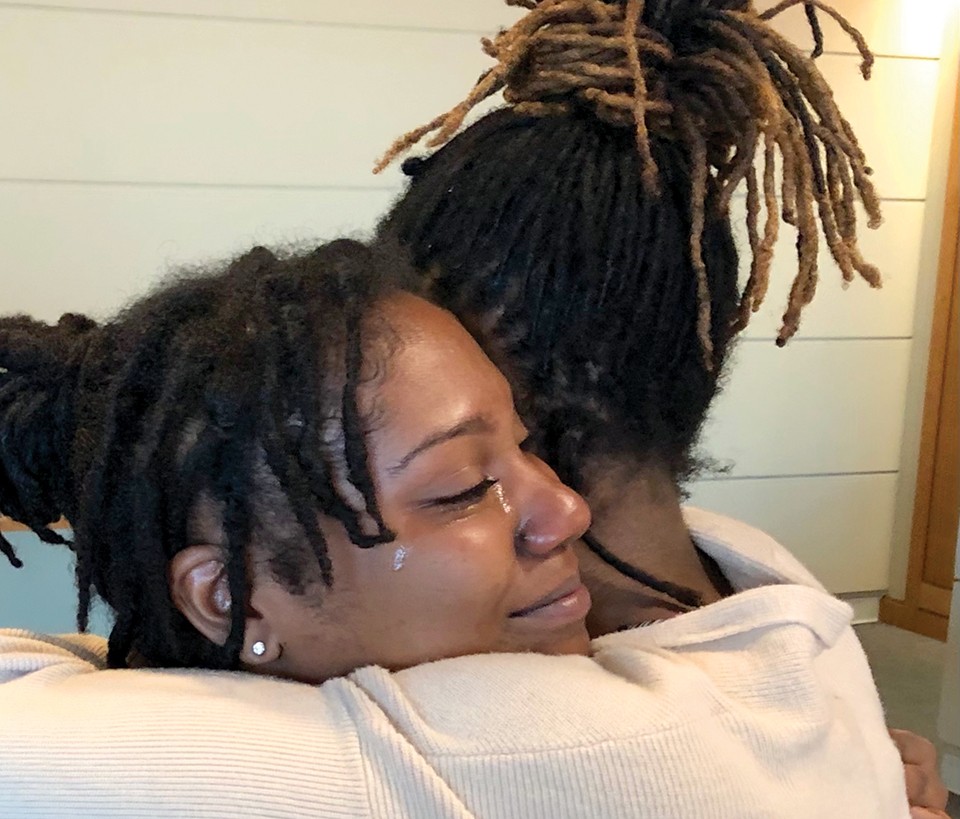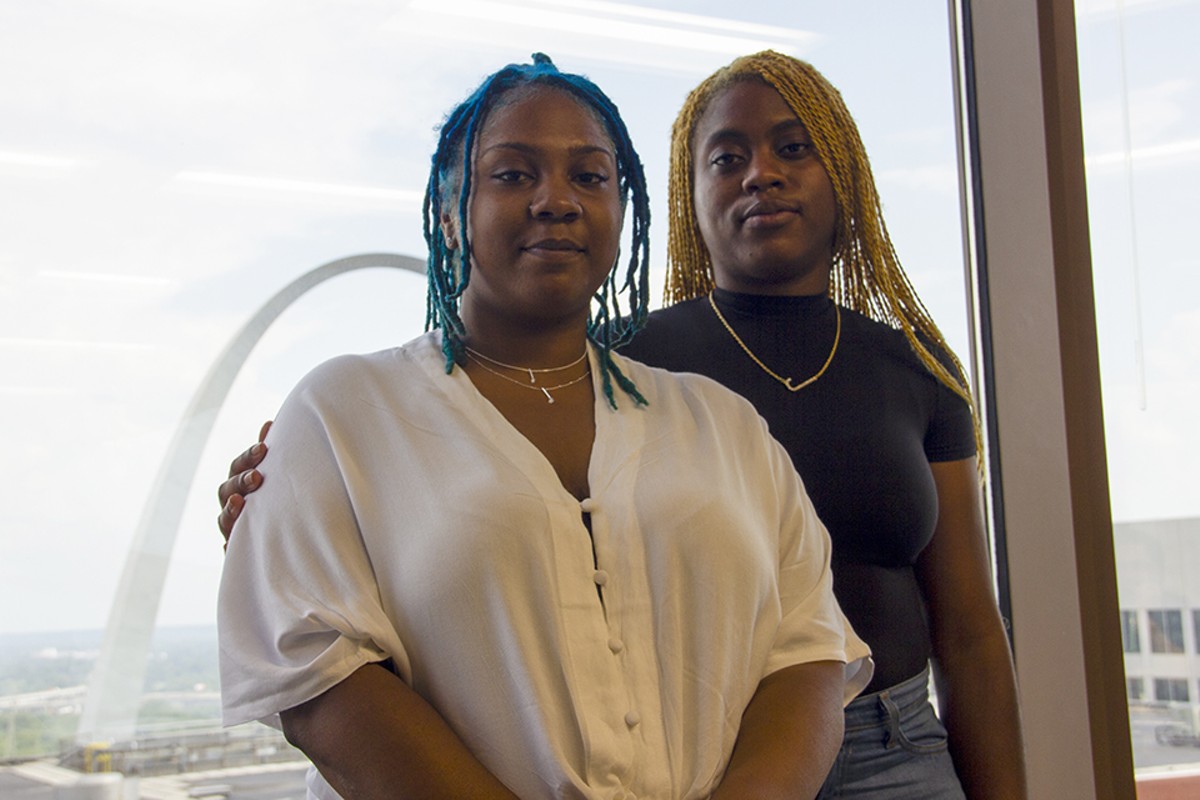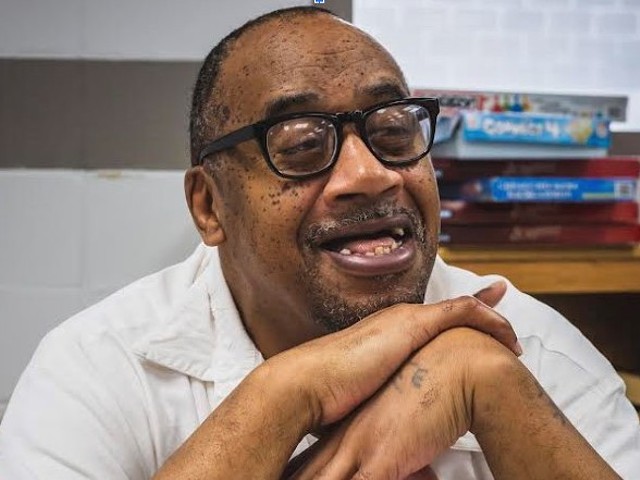A camera recorded Sgt. Jason Groves of the Riverview Police Department as he explained his observations of two Black women who were walking together in the early morning hours of August 11, 2016.
"They were acting very suspicious in nature," Groves says in the sworn deposition in February 2017. "They were walking around that corner, kind of Neanderthalling around, kind of moving around in a strange manner."
At the time of the recording, nearly six months had passed since Groves and a partner confronted Deja Holland and Najae Jordan. Both women were arrested and faced multiple criminal charges for assaulting a police officer, resisting arrest and disorderly conduct.
Groves delivers his testimony in the patient, self-assured tone of a veteran cop. Across a table, he faced defense attorney Thomas SanFilippo, who happened to know more about the night in question than he was letting on.
In fact, SanFilippo had already obtained key surveillance footage of the incident from a nearby business. The moment Groves was now describing — how he had supposedly followed his cop's instincts to realize that the women's "Neanderthalling" required investigation — appears to have elapsed over about five seconds on video. The footage shows a Riverview patrol vehicle, lights flashing, as it cuts sharply in front of the figures of Holland and Jordan, who were walking home at about 1:30 a.m.
"As a police officer," Groves continues in the deposition, "you do this long enough, obviously you watch body language, and you learn people very, very well when something is not right."
According to Groves, it wasn't just their posture, but the pair's location that justified his suspicion: Riverview is a tiny village in north St. Louis County, covering less than a single square mile near the riverfront, but as Groves explained, it has a bustling drug trade which he knew to be centered on an intersection near Diamond Drive and a small convenience store.
As Groves and a partner drove through the area that summer night, he tells SanFilippo, they spotted the two women "kind of looking around, almost like they were on that corner waiting to either buy something, purchase something, or something of that nature."
"In the narcotics realm of gang interdiction, we call it TU — Thug University," Groves says, "because that's where they go to learn the trade of heroin, cocaine — anything you can think of. They meet and they congregate there."
But Jordan and Holland were not who Groves made them out to be. The women lived together in Riverview and had been just blocks from their apartment when officers pulled up. They had no criminal records, and, beyond the purported display of suspicious body language, Groves could offer nothing to connect them to the drug corner, or any crimes for that matter.
Looking back on it today, SanFilippo calls Groves' statements "the most racist thing I've ever heard in a deposition." But he wasn't the only attorney present that day to hear them.
There was also Wesley Bell. Before his dramatic 2018 political ascent to become St. Louis County prosecuting attorney, Bell worked in multiple roles in municipal court systems across north St. Louis County. In Riverview, he had served as the municipal prosecutor since 2012.
Like any prosecutor, the position came with the responsibility to choose which cases to pursue, what crimes to charge and what punishments to seek if those cases progressed to trial.
But Bell didn't want this case to go to trial. For one thing, Groves' deposition was a defense attorney's dream: In a village where the population is 70 percent Black, here was a white officer under oath, describing a process for targeting two Black women that had nothing to do with seeing evidence of a crime — and that was just the start of Groves' questionable behavior that night.
Bell could have dropped the case. Instead, eleven months after Groves' deposition comments about "Neanderthalling," the Riverview prosecutor sent SanFilippo a written offer that would make the criminal charges pending against his clients simply disappear.
It came with a catch: The women would have to agree to never sue the Village of Riverview or the cops who terrorized them.
All they had to do was sign their names, and walk away.
August 11, 2016, had started out as a normal day for Najae Jordan and Deja Holland. The couple woke up early to catch two buses and a MetroLink train to arrive in time for their shifts at a Walmart in Chesterfield. In the evening, they returned to the small apartment in Riverview, on Diamond Drive, where they'd been living together for about a year. They later went to visit a friend.
At about 1:30 a.m., they were walking home when Jordan says she noticed the Riverview police patrol car pass them. It slowed, and from within came the voice of an officer asking her how her night was going and where she was heading.
"I was just like, 'We're just minding our business,'" Jordan says. Holland remembers the exchange as well — and that the cop didn't like Jordan's response.
"That triggered him," Holland says. They would later learn the officer was Sgt. Jason Groves. The intensity of those moments is still fresh in their minds, the feeling of being watched as the patrol car rolled by — only to realize that it had circled back for a second pass.
Jordan remembers the events happening fast: "They pulled the car in front of us, and they were like, 'Put your hands on the hood.'
"I just felt like, 'This is wrong. We didn't do anything,'" she says. "So, I pulled out my camera at that point, and I was shaking so bad I couldn't pull up the camera app."
That was when Jordan says she heard Groves shout to Officer Jeffrey Lakebrink: "Get her phone." Jordan says she "went into panic mode and just started walking backwards."
By then, she had managed to activate the camera app. The resulting video clip, about a minute long, shows Jordan running from Lakebrink.
"It's the police following me, y'all," she says in the recording, which was reviewed by the Riverfront Times. "It's Riverview police following me. They got mad because I wouldn't tell how my night was going, so he mad and chasing me."
The video captures the figure of Lakebrink trailing behind in the dark. The audio includes the sound of Jordan's flip-flops slapping against the pavement and Groves shouting after her, "I'm going to mace you."
Jordan evaded her pursuers, sprinting for two blocks and making it to her apartment complex.
The door to the building was usually locked, but not that night. Jordan slipped inside. She says she immediately called her father, who lived just a few streets over.
While Lakebrink chased Jordan, Holland says, Groves stayed behind. He removed her handcuffs — "I'm only doing this because you're cooperating," she remembers him saying — and together they made the short walk to the glass front door of the apartment building.
At this point, a surveillance camera from a nearby convenience store shows Groves, Lakebrink and Holland walking toward the building. A third cop, a Bellefontaine Neighbors officer named Michael Pedroli, also arrived on the scene, just in time to participate in the standoff at the transparent front door.
Inside was Jordan. With the officers just feet away, Jordan began opening and closing the door as she frantically shouted at Holland to get inside, but there was too much space between them, and too many cops. After several tries, Lakebrink and Pedroli successfully grabbed the door before it closed and hauled Jordan out onto the sidewalk.
On video, Holland appears to walk towards the two officers who were pinning her girlfriend to the ground. Illuminated only by the light from the apartment door, the footage doesn't show exactly what happens next, but Holland appears to make some sort of physical contact with the officers. Crouched on top of Jordan, Pedroli pushes at Holland, while Groves appears to rip her backward by the shoulders. She slams into the ground and rolls back on her head.
Asked about it today, Holland says she can remember only the shouting, and then blacking out.
Jordan remembers being tackled and held on the sidewalk. One officer was on her back, she says, "just cussing and yelling stuff at me — 'You're assaulting a police officer, stop resisting, stop resisting.'"
The night was far from over. Back at the station, Lakebrink spent the next hours typing out a police report with a description of the incident. The report's narrative ends with Jordan and Holland being processed, booked and released. But it omits one final example of Groves' brand of police work.
With both women in custody, Groves was still thinking about Jordan's phone. Police couldn't find it when she was searched at the station. Unbeknownst to the sergeant, amid the chaos of the arrest scene, the phone had actually been recovered by one of the half-dozen officers who had arrived as backup.
Jordan had backup of her own. Alerted by her call, her father had shown up just in time to see his daughter being hauled away in handcuffs. Still, Jordan says, she was able to talk to him, urging him to retrieve her phone from the officer leading her away. To her shock, the officer agreed; he handed the phone to her father and allowed him to leave without incident.
After a ride to the police station, Jordan was placed in a holding cell, while Holland, still dazed from the impact of her head bouncing off the sidewalk, found herself shackled in an office area while Groves made coffee and small talk with the other cops. She remembers watching Lakebrink hunched over a keyboard as he wrote the incident report.
The finished version would describe Holland as the aggressor during the arrest. It described how she had "attempted to push PO Pedroli off Jordan," and in response, Pedroli "was forced to push her away with his left arm [and she] stumbled back and fell to the ground."
Holland says she sat in the office for about ten minutes before Groves approached her with an update. He told her she was being released, but that wasn't all. Holland remembers him saying, "I'm going to take you home," and then adding, "We need that phone."
Holland claims she had already told Groves that she didn't know where Jordan's phone was, but he was set on trying to find it. Seated in the patrol car with Groves, Holland remembers riding in almost total silence, with Groves speaking only once, as if to himself: "Yeah, I'm going to need that phone."
"When we got to the apartment, and I asked him, 'Is this part of this procedure?' He's just like, 'Get out the car, open the door' — he was real demanding," she says. "When we got up there, he didn't want me in the apartment with him. He said 'You wait here,' and so I stood out in the hallway."
The apartment was small, more like a hallway with a bedroom, kitchen and bathroom tacked on. It didn't take long for Groves to conduct his search and exit, meeting Holland at the apartment door.
Again, he asked for the phone, Holland says. She was terrified.
"I told him again, 'I have not seen the phone,'" she recalls. "And then he just left the door open and walked away. And at that point, I just stood there until he pulled off. I didn't even go into the apartment. I waited until I saw his lights go away."

On November 29, 2017, Jordan and Holland received Wesley Bell's offer of a deferred prosecution agreement. Taking the deal would require them to sign away their rights to file any legal complaints while allowing Riverview to refile the charges at any time. On the last page, Bell had left a yellow Post-it note with his number. He had signed it "Wesley" and underlined it with a squiggle.
The arrests had sent the couple's lives "into a spiral," Jordan says; for the first time in her life, she had failed a background check, losing out on a job because her name was linked to a pending charge for "assaulting a law enforcement officer." Out of work, they left the cramped apartment in Riverview and separately moved in with family members as they tried to make ends meet. They eventually broke up, but they remain close friends.
The two considered their options. They had a chance to move on.
Facing the decision "was devastating," Jordan says. When she imagined letting Groves and Lakebrink off the hook, she couldn't help but think of Michael Brown in Ferguson, whose shooting death in 2014 started in very much the same way as her ordeal had begun in 2016. An officer yelling through a car window and demanding compliance. A senseless confrontation. Escalation. She knew how these incidents could play out, how easily they seemed to end in death.
"Signing it, it would be like letting other people down that didn't get to survive," she says.
Holland felt the same way. "That wouldn't be justice. That's like slapping us in the face, like it's whatever, 'Just two Black girls.' We could have ended up dead that night. Anything could have happened to us."
They left Bell's forms blank, choosing instead to fight the charges. It was a challenge that their attorney, Thomas SanFilippo, was already prepared to tackle, as he had obtained key surveillance footage of the arrests and had Groves' bold testimony about "Neanderthalling" as additional evidence that the initial stop lacked the legally required "probable cause."
But the surveillance camera facing the apartment complex had captured more than just a scene of three cops throwing Jordan and Holland around on the street. More than an hour later, video footage viewed by the Riverfront Times shows Groves returning to the apartment complex — with Holland, supposedly "released" from custody, following him inside.
That's a substantial step more than is suggested in the incident report, which describes only that "Sgt. Groves transported Holland back to her residence."
Confronted with the surveillance footage during the 2017 deposition, Groves admitted that he had entered the apartment building to search for Jordan's phone — because, in his telling, it would support the charges against the two women.
"Oh absolutely, we would love to have that phone," he testified, "because that phone showed the type of demeanor that they had."
Groves offered his own version of what happened upon his return to the apartment: While acknowledging that he did not have a warrant and that he had not asked Holland to sign a consent form to search, he claimed that he never actually entered their apartment itself. Groves claimed that, at the time, he believed the phone Jordan used to make the recordings actually belonged to Holland. (Why he would believe this is not clear.)
In any case, he said that when he learned from Holland that the phone wasn't hers — a moment that apparently took place after they entered the building — he told her he could not conduct the search and left.
The cracks were already showing in Groves' story, but he would have another opportunity to make his case. Called to the witness stand during the December 2019 trial of Jordan and Holland, he faced cross-examination.
It would be the first time Holland and Jordan would hear the word "Neanderthalling," a term defined by Groves as the suspicious activity of "walking around back and forth" near the known drug corner in Riverview.
Attorney Nicholas Brown pressed Groves on his reason for stopping Jordan and Holland that night. "You've never seen a Neanderthal, have you, because they've been extinct for 40,000 years."
"No," Groves replied, he had never seen a Neanderthal and was "not well versed in the background of Neanderthals." Still, under steady questioning from Brown, Groves acknowledged that the term is associated with being "primitive," "brutish" and "ape-like."
Jordan and Holland say his testimony hurt to hear.
"We both broke out into tears," Jordan says. "That was the first time hearing how he really felt. It surprised me that he said those kinds of things about us and our character."
Holland couldn't help but wonder what the jury thought of them. Would they buy Groves' explanations?
"It was the first time, like, in a courtroom, being in trouble, so it's a lot of pressure," she says. "We didn't know how people are viewing us. We were going up against the police, two Black women."
After three days of trial, it took the jury less than two hours to return with a verdict. Jordan and Holland were acquitted on all counts.

After the trial, Jordan and Holland were finally free of criminal charges that had tangled round their lives since their arrests in August 2016. But in turning down Bell's offer to defer prosecution, they had rejected a choice many defendants have taken in the past: Known variously as agreements for "deferred prosecution" or "release dismissals," similar policies have historically been used in both St. Louis and St. Louis County.
These sorts of dismissal agreements "really mislead about what defendants' rights are," says Peter Joy, a law professor at Washington University and coauthor of a 2018 research paper that weighed the legal ethics of such agreements' use.
The paper concluded by arguing that prosecutors "should not be allowed to use such release-dismissal agreements" and that those who do are taking "serious ethical risks" around a conflict of interest.
It appears that Bell took that exact risk in 2017. Submitted as an exhibit in a pending civil lawsuit, the deferred prosecution agreement offered to Jordan and Holland was a two-page form letter that appears to have been originally drafted for use in criminal cases involving a victim.
In the cases of Jordan and Holland, Bell had made some adjustments. A copy of the document shows Bell had added several strike-throughs marked with his initials: He erased the agreement's three listed "special conditions," which would have forced the signer to complete an anger management program, perform 25 hours of community service and have "no contact with the victim during the deferral period."
With those conditions deleted, all that was left were the provisions protecting Riverview and its police from civil litigation — although there was also a paragraph stating that the person signing the release agreed "that there was probable cause for my arrest and that my arrest was not based on false information."
In an interview, Joy explains that while the U.S. Supreme Court considers deferred prosecution agreements legal on a case-by-case basis, they cannot be applied as a blanket public policy. He also believes the agreements are likely unenforceable as legal documents: He says he has yet to find a single case where a prosecutor made good on a threat like the one spelled out in the Riverview dismissal release, which reads: "If I do violate any condition ... I understand the charge will be re-filed and I will be prosecuted."
Joy points out that most people reading those words don't have a lawyer. They're scared, cornered and looking for a way out. They're willing to do anything.
On the other side of the equation is a municipal prosecutor, whose role is to handle criminal matters only, not to defend the city's civil liabilities — that's what the village attorney or city counsel is for.
For Joy, a prosecutor crossing that line isn't just trying to do someone else's job, but also damaging their own.
"Here is the clash of these interests for the prosecutor," Joy says. "If this person really committed this crime, then the prosecutor should perform the law enforcement function and go forward. If there's no crime, the prosecutor is obligated to dismiss the case — not dismiss it while extracting this liability on behalf of the city."
It's not just Joy who feels that way. In January, it was none other than St. Louis County Prosecutor Wesley Bell criticizing a City of St. Louis policy very similar to the one he had overseen in Riverview. As revealed in lawsuits, defendants in St. Louis had for years been given the choice of having their resisting-arrest charges dropped if they signed a one-page "release" to protect the city "from any and all liability arising from my arrest."
In remarks to the St. Louis Post-Dispatch in January 2021, Bell said, "I am aware of this policy in the city of St. Louis and always disapproved of it," adding, "It seems inherently wrong and unethical."
Thanks to Wesley Bell's persistent prosecution, Riverview ultimately spent more than three years trying and failing to convict Holland and Jordan on a collection of criminal charges.
But at trial in December 2019, Bell wasn't there to see their vindication.
By then, he had moved up in the world, winning a resounding election for St. Louis County prosecuting attorney in August 2018; Bell beat seven-term incumbent Bob McCulloch, winning the campaign on a promise of creating a progressive prosecutor's office that would, among other things, hold bad cops accountable.
Bell has done that, to some degree, including the filing of felony assault charges against two Velda City cops last summer for shooting and injuring a driver fleeing a traffic stop.
But what Bell left behind in Riverview has come back — in the form of a civil rights lawsuit. Filed in August by SanFilippo, the suit's defendants include officers Groves, Lakebrink and Pedroli, as well as Riverview village attorney Christopher Graville.
As for Bell, the suit accuses him of aiding in a conspiracy to lead a "sham prosecution" against Jordan and Holland, "for the sole purpose of hindering their ability to secure their rights" after being racially profiled and illegally arrested.
"Wesley could have stopped this at any time, and should have stopped it during the deposition of Sgt. Groves, because it was clear in that moment what the true motives of the stop and detention were," SanFilippo says now; he points out that during the months of Bell's campaign as a reformer in the county prosecutor's office, he was simultaneously prosecuting two Black women whose only suspicious activity had been walking near the wrong corner while in sight of the wrong cops. (It's unclear if Groves or Lakebrink have faced any repercussions. A Riverview police representative tells the RFT that Groves is still with the department but Lakebrink is not.)
Bell has pushed back against the lawsuit through his spokesman Chris King, who told the Post-Dispatch in August that the Riverview police officers involved in the arrest had "conducted themselves with restraint and professionalism."
Jordan read King's comments in disbelief. "That was surprising to me," she says. "It's just like they're doing this all over again. Like, please, give us a break. You guys have been telling the story and narrative for so long. Just let us tell our side."
Last month, the RFT reached out to Bell's office with questions about his role in the prosecution of Jordan and Holland. Through King, Bell declined a request for an interview, citing the pending litigation that names him as a defendant.
Instead, King provided a statement defending Riverview's use of a deferred prosecution agreement in the case, writing, "The facts can be disputed, but it was the city's belief that the defendant punched an officer."
Bell, through his spokesman, initially denied hearing Groves' comments about "Neanderthalling" and "Thug University" during the 2017 deposition, or even being in the room. But Bell appears on video footage of Groves' deposition and is listed as present in the official transcripts.
King writes, "Mr. Bell is not aware of those statements being made by Groves and they would have had no bearing on any charging decisions."
"All things considered," King's statement continues, "in this matter the defendants [were] never faced with jail time and, because of the nature of the allegations, offering deferred prosecution, where the defendant admits guilt but is only required to stay out of trouble, does not appear unreasonable and is in line with progressive policies that Mr. Bell has put in place."
Follow Danny Wicentowski on Twitter at @D_Towski. E-mail the author at [email protected]






